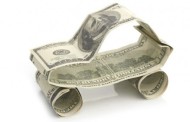
5 Mistakes Car Buyers Make
If you need a new set of wheels, the idea of a change (or at least reliable transportation) has undeniable appeal, but figuring out which car you want and can afford, whether to buy new or used, plus whether you’re getting the best deal, can quickly take the fun out of shopping.
It’s easy to make a mistake, and some mistakes can outlast a new car. Here are a few that catch some shoppers off-guard.
1. Focusing on the Payment Amount
If you’ve recently paid off a car, you probably know the figure that fits comfortably in your monthly budget, and that might be the amount you want to pay for your new ride, too. It’s easy to get caught up in the excitement of getting a new car with affordable payments and not think as much about how many payments there will be.
Matt Briggs, automotive finance expert and CEO of Credit Jeeves, said basing a decision on the monthly payment is the biggest mistake car shoppers make. “Dealers and lenders have caught on, and the average lengths of auto loans are at record highs. Consumers end up paying more in interest and are upside down in car equity for longer,” he wrote in an email.
2. Not Knowing How Long You’ll Pay
Before you sign on the dotted line, it’s important to consider how long you are willing to make payments on your new wheels. Some experts suggest 60 months for a new car and 36 months for a used car. But the average new-car loan has reached 66 months. It is not uncommon for banks and credit unions to offer loans of up to 84 months on new and even used cars — that’s seven years of payments!
3. Not Knowing How You’ll Pay
It’s possible to get your financing approved before you walk into a showroom, and it’s a good idea. You can arrange for a loan the amount you intend to finance with a bank or credit union. (You can find credit unions that offer car loans nationwide here.) This has a couple of advantages. It reminds you of the amount you’re willing to borrow and the length of the loan you wanted before you walked into the showroom, while you were looking at your budget and when you were not influenced by new-car smells or a deal that will (probably) be gone if you don’t act now. (What will more likely be gone is the opportunity to get a car loan at a lower interest rate.) Briggs said that in most cases, credit unions can give you a better interest rate than dealers can.
It’s smart to shop for financing before you shop for your car. But before you even apply, you should pull a copy of your credit report and to make sure the information is accurate. A lender will also look at your credit scores (you can access your credit data for free on Credit.com) to help make a decision about how creditworthy you are and, ultimately, whether to lend you the money and at what interest rate.
4. Making a Trade-In Part of the Deal
In most cases, Briggs says, you’ll do better selling your old car yourself than you will trading it in. You can look up the average prices for cars the same make and model as yours on Kelley Blue Book. If the convenience of leaving your old car at the dealership is too much for you to pass up, be sure that you do the two deals separately. Know what the drive-out price is for the new car is, without a trade and what it would be with a trade. You might also go to a dealer that buys used cars and find out what their offer on your car would be sure the dealer’s is competitive. Neither this nor trading in at the dealer is likely to yield as much as a private sale, though.
5. Forgetting About Insurance
Cars with similar prices can carry dramatically different prices for insurance. If you’ve been driving a 17-year-old car and you dropped the collision insurance years ago, you will almost certainly pay more to insure your new wheels. On the other hand, if you’re trading your sporty two-door convertible in for a minivan because your lifestyle has changed, you may save on insurance. Either way, it’s a number that should factor into your budgeting decisions.
Another type of insurance you might need to consider is so-called gap insurance, which covers the difference in the car’s actual value and how much you owe on it. Some lenders require it, because it protects their collateral (your car).
Car insurance can also vary wildly depending on your credit score. In some states, the difference in price can be almost double for those with bad credit.






